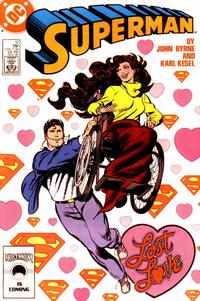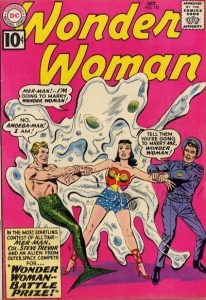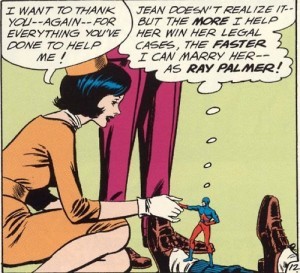It’s commonly said that it was Marvel Comics introduced personality and problems into the super hero characters in the 1960s. The Fantastic Four fought among themselves, Ben Grimm hated being the Thing and Sue Storm was torn between Reed Richards and the Sub-Mariner. Iron Man had his injured heart which required the metal chest plate but kept him from leading a normal life. And Spider-man? There’s not enough room in this article to list all of his problems.
But DC comics, especially those edited by Julius Schwartz, actually began to insert humanizing traits into their characters in the 1950s. True, it was never the driving force of the stories, it least at that time. More like seasoning thrown into a meal, to give the stories added flavor. Almost all the characters DC introduced, or re-introduced were given a little extra dimension.
 I haven’t read as widely in Golden Age material as I’d like, but I don’t recall many attempts at even shallow depth in the writing of the heroes. And when there was it was more likely given to the sidekick or comic relief characters.
I haven’t read as widely in Golden Age material as I’d like, but I don’t recall many attempts at even shallow depth in the writing of the heroes. And when there was it was more likely given to the sidekick or comic relief characters.
Superman, Batman and Wonder Woman, of course, cruised right through the Golden Age to Silver and beyond. Superman usually had to go to imaginary stories to show more flare (though I do remember he showed more love and heartache, falling for wheelchair-bound Lori Lemaris, who was actually a mermaid, than he ever showed for Lois back then).
Batman…forget about it. He might dress up in a tuxedo as socialite Bruce Wayne once in a while, but only to go to a fancy function that would subsequently be robbed.
Wonder Woman had what most comic-book women were stuck with back then: romantic problems. She had at least three regular suitors: Steve Trevor, Mer-Man and Bird-Man. They would usually attempt something foolish to impress her, and she would have to rescue them.
then: romantic problems. She had at least three regular suitors: Steve Trevor, Mer-Man and Bird-Man. They would usually attempt something foolish to impress her, and she would have to rescue them.
But the next generation of heroes…
The Flash was the first to be re-introduced in a new incarnation. As Barry Allen, police scientist, he would get so wrapped up in his work that he was chronically late. And he had a steady, in Iris West, who he would either stand up or be late when they had a date. He even showed jealousy when she spoke highly of a researcher, an old friend of his, that he had introduced her to.
 Green Lantern’s problem was that the woman he loved as pilot Hal Jordan, Carol Ferris, was in love with the costumed hero Green Lantern and not him. SHE had a problem when it became known that she was destined to be the queen of a race of women as Star Sapphire, but she had to defeat Green Lantern to earn the position.
Green Lantern’s problem was that the woman he loved as pilot Hal Jordan, Carol Ferris, was in love with the costumed hero Green Lantern and not him. SHE had a problem when it became known that she was destined to be the queen of a race of women as Star Sapphire, but she had to defeat Green Lantern to earn the position.
The Atom’s girlfriend, Jean Loring wanted to prove herself as a lawyer before she would marry Ray Palmer (and probably quit then to become a homemaker-this was still expected in the early sixties). Unlike many reticent heroes he WANTED to marry her.
Hawkman was happily married to Hawkgirl, both of them police officers from another world, but he had to put up with her jealousy, and his discomfort, when a co-worker at the museum would flirt with him.
Adam Strange’s love affair would suffer from interruptus when the Zeta beam that carried him to Alanna’s planet would wear off, returning him to earth and taking him away from Alanna until the next issue.
I’ve never read anything that suggested it was a conscious corporate decision to expand the lives of the characters. Partly it may have been a sign of the times. Books and movies of the post-World War II years began delving into the psychology of their characters more. But it may have been something that the writers did to make their jobs a bit more interesting, and give them something to help fill out the many pages which need to be written to make a living. Marvel clearly didn’t create the movement, but carried it much further, onward and upward, to the point that creating a new character isn’t about coming up with a new power. Rather it’s finding a burdening personality and social situation for the character to suffer under.

